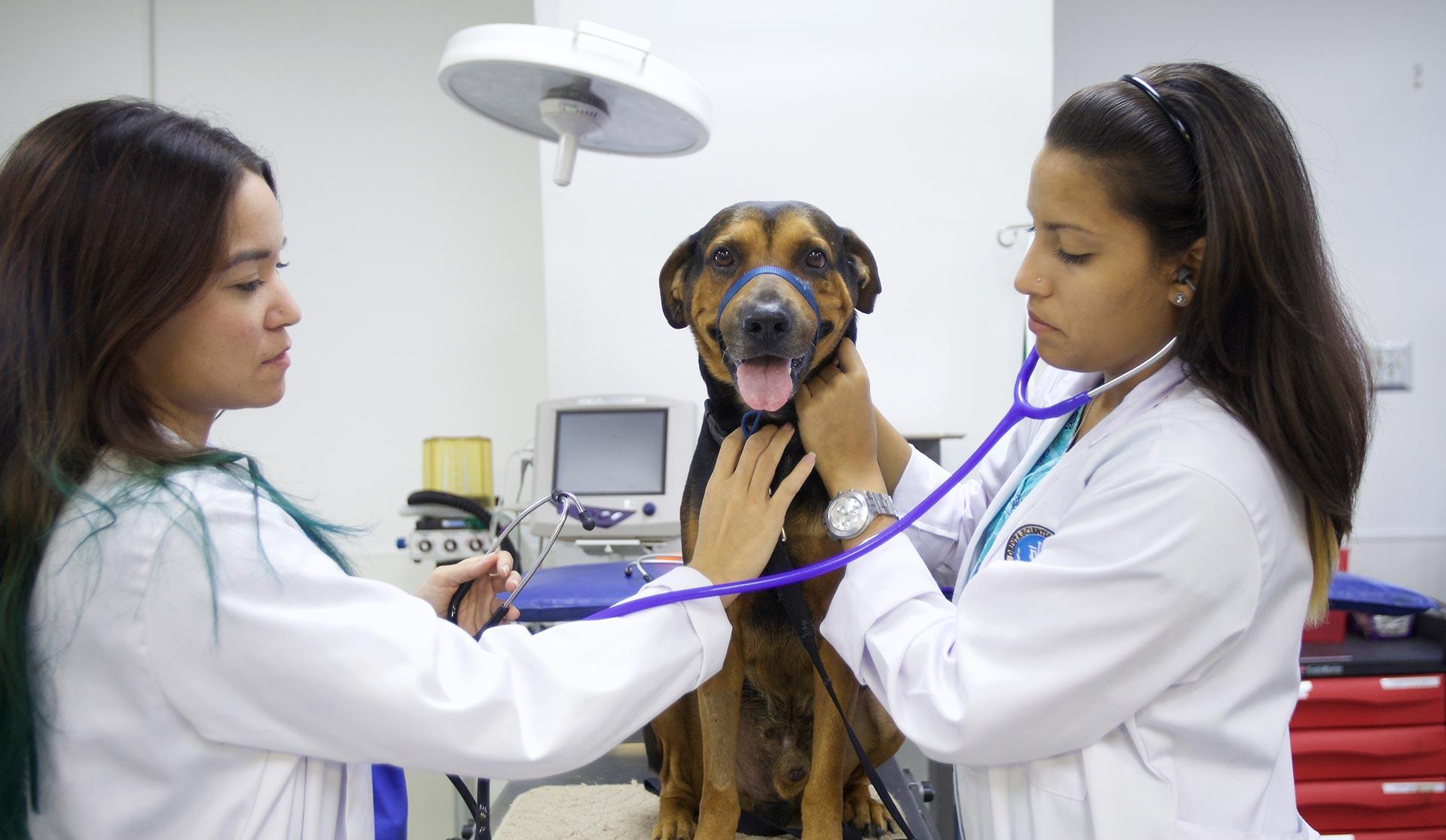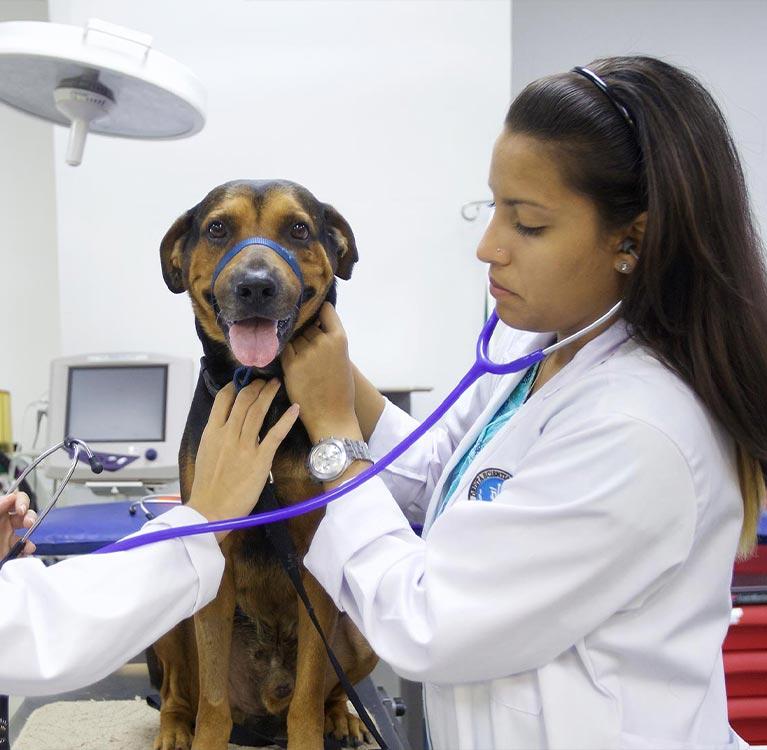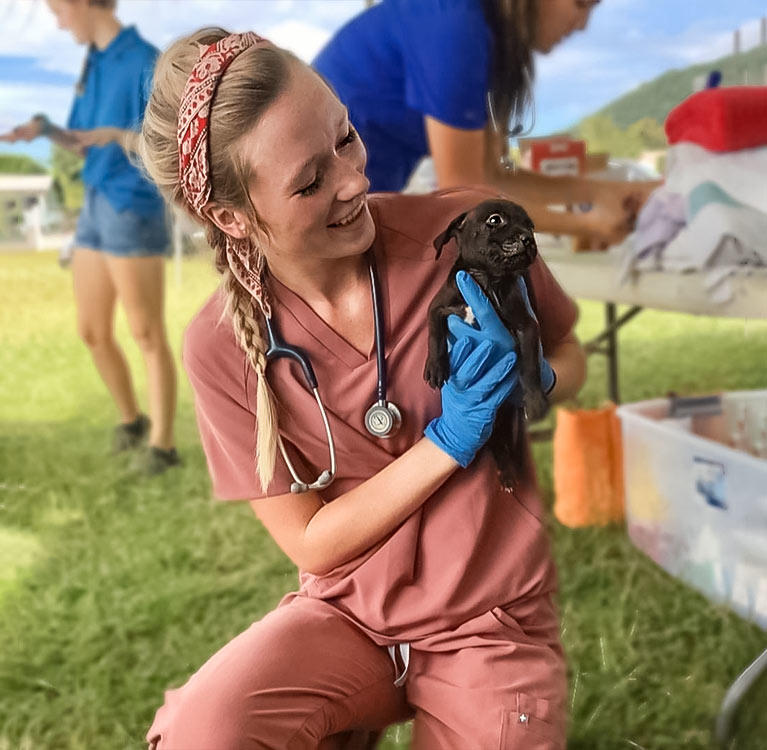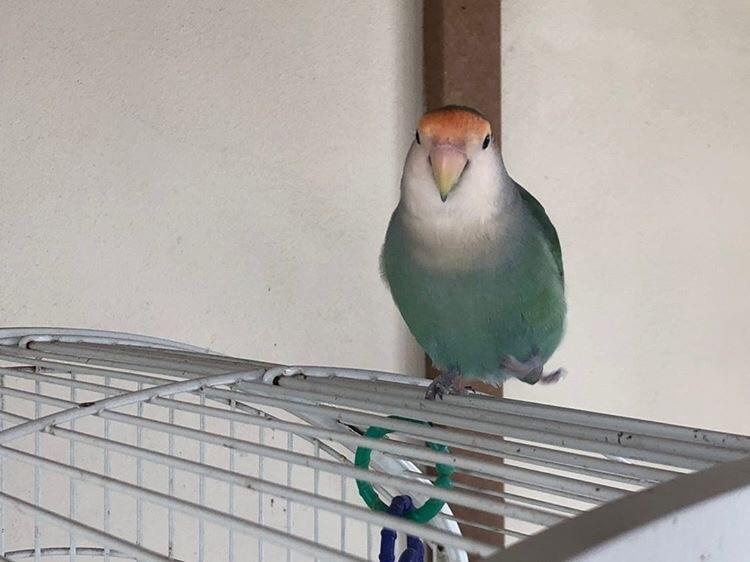After earning a Doctor of Veterinary Medicine (DVM) degree from an accredited veterinary school such as Ross University School of Veterinary Medicine (Ross Vet), most vets go into private practice, but that isn't the only veterinary career path available—nearly 50 veterinary specialties are open to DVMs. They can choose to impact public health, participate in groundbreaking research, teach future veterinarians, work for animal rights organizations, or perform various other duties in numerous fields and industries. Being a vet can be much more than just caring for animals—but animal health and well-being, of course, is the end purpose and goal of nearly all veterinary professions.
CAREER OPPORTUNITIES IN VETERINARY MEDICINE
CLINICAL VETERINARY JOBS
Most veterinarians choose a clinical veterinarian career path, either as a general practitioner (GP) or a specialist. Two-thirds of clinical veterinarians are GPs who care for companion animals—cats, dogs, and other household pets. These are the vets most people know, the versatile DVMs who pet owners see regularly for their animal’s wellness checks or medical issues. GPs typically go into practice after graduating from veterinary school and getting licensed, while specialist clinical veterinarians may complete extra schooling and training to care for exotic animals, horses, livestock, and poultry, or perhaps laboratory, marine, or zoo animals. Companion animal GPs commonly work in small clinics or animal hospitals; specialists often travel to see animals where they live, visiting aquariums, farms, laboratories, markets, refuges, zoos, and other locations.
Some clinical DVMs choose to specialize further, focusing on defined groups of patients, diseases, skills, or care philosophies. Specialists may concentrate entirely on an individual species—a feline practitioner, for example, only cares for cats; groups of animals, such as aquatic and marine animals; certain types of treatment—animal sports medicine and rehabilitation, for example; or such specialty fields as acupuncture, behavioral medicine, dermatology, cardiology, dentistry, radiology, radiation oncology, nutrition, oncology, ophthalmology, surgery, theriogenology, and zoological medicine.
GOVERNMENT VETERINARY JOBS
After earning a DVM degree, veterinarians may choose from numerous career opportunities through local, state, and federal governments. Look around your own city or county and you’ll find vets who work in public shelters and animal care and control as well as police and fire departments. State-level veterinarians may work for parks, wildlife sanctuaries, or agriculture, natural resources, and public health departments—those for both animals and humans.
Federal governments employ many veterinarians, particularly in the United States, where the Department of Agriculture Food Safety and Inspection Service is the country’s second largest employer of veterinarians (after companion animal practice). Vets and DVM-trained epidemiological researchers ensure that food animals are kept healthy and treated humanely and that all meat, poultry, milk, eggs, and other animal food products are safe to consume. The U.S. Food and Drug Administration (FDA) employs DVMs in the Center for Veterinary Medicine (CVM) as part of their mission to protect human and animal health. The U.S. Centers for Disease Control and Prevention (CDC) hires DVMs, particularly those with research training, and offers fellowship programs for veterinarians interested in epidemiology and laboratory animal medicine. The National Institutes of Health (NIH) Division of Veterinary Resources encourages veterinarians to pursue biomedical research opportunities and offers advanced training programs for students interested in a research career. Animals and humans share many of the same diseases, creating a need for DVM scientists. Veterinary research efforts can help keep the public safe, especially considering the increasing prevalence of zoonotic diseases that spread between animals and humans, like Ebola (which humans can catch from infected bats or nonhuman primates) and the Middle East respiratory syndrome coronavirus (MERS-CoV) (which transmits from camels to humans).
Veterinarians serving in the military provide care for dogs, horses, and other working animals, as well as food animals and soldiers’ pets. Military DVMs may also help rebuild and improve animal care systems in underdeveloped and war-damaged countries; help control animal- and food-borne diseases; or participate in biomedical research and development. The U.S. Army Veterinary Corps provides animal services to all branches of the military; the Air Force Civilian Service employs many veterinarians; the Marine Corps has its own Veterinary Treatment Facility; and the U.S. Navy needs vets for its Marine Mammal Program.
PRIVATE SECTOR VETERINARY JOBS
Private sector veterinarians work for corporations, individual companies or industries, or nonprofit and nongovernmental organizations (NGOs). Depending on the employer, the veterinarian’s job may be to care for animals, lobby for the humane treatment and protection of animals, oversee animal research, or any other animal-related service. Corporate animal hospital groups and emergency services hire many veterinarians, as do companies that use animal-related products or perform research or testing. Nonprofit and NGO employers include the American Society for the Prevention of Cruelty to Animals® (ASPCA®), People for the Ethical Treatment of Animals (PETA), and World Wildlife Fund (WWF®), to name a few.
The American Veterinary Medical Association® (AVMA®), the American Association of Veterinary Medical Colleges (AAVMC™), state veterinary associations, veterinary diagnostic labs, international animal health agencies, and veterinary practice publications and publishers also have many career opportunities open to DVMs.
ACADEMIC VETERINARY CAREERS
As long as there are veterinarians, there must also be veterinary schools filled with DVMs—often those who have earned a Doctor of Philosophy (PhD) degree as well—who teach the art and science of veterinary medicine. The AVMA Council on Education® (AVMA COE®) accredits nearly 50 veterinary colleges, including Ross Vet, whose faculty comprises numerous experienced DVMs and PhDs. DVM-PhDs teach courses or perform research, laboratory, or other services at numerous non-veterinary universities and colleges as well.
As you can see, a DVM degree opens the door to diverse opportunities for a meaningful career. At Ross Vet, we give our students the solid academic and clinical foundations from which they may excel in veterinary private practice or explore the many DVM specialties and career paths—those listed above, plus numerous others. Ross Vet provides an accelerated, broad-based curriculum that integrates classroom study, research, and hands-on training. If you think veterinary school may be for you, learn more about Ross Vet. Review the admissions requirements and take the next step on your path to becoming a veterinarian. Apply for admission to Ross Vet today!








